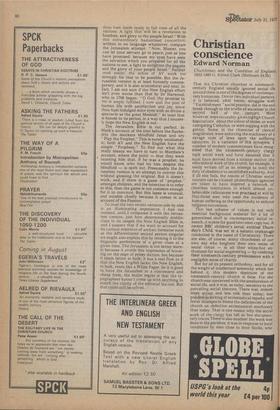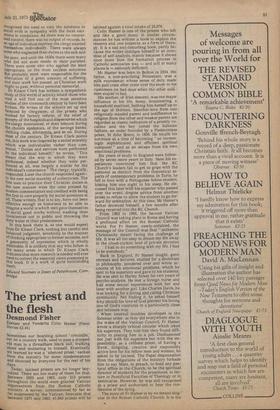Christian conscience
Edward Norman
Churchmen and the Condition of England, 1832-1885G. Kitson Clark (Methuen £4.50) That the Christian churches in nineteenthcentury England usually ignored social ills around them is one of the dogmas of contemporary humanism. One or two individual parsons, it is believed, after heroic struggles with "Establishment "social practice, did in the end break through to the truths of socialism in the second half of the century: Most however, were incurably given topigh Church lisputations about the colour of stoles, or were castigating Catholics, or were supping with the gentry. Some, in the character of clerical magistrates, were enforcing the machinery of a savage code of laws upon the suffering labourers. In a variation of this Synopisis, a number of modern commentators have recognised that the nineteenth-century clergy took social work and have assumed that it must have derived from a sinister motive: the educational work of the church, for example, is easily written off as an attempt to instil the duty of obedience to established authority. And if all else fails, the results of Christian social concern can be vitiated: philanthropic agencies are taken to have inspired a network of cheerless institutions in which almost unbelievable callousness was practised at will by flint-faced men who used the incidence of human suffering as the opportunity to enforce religious conversion.
This last scheme of values is not only essential background material for a lot of generalised stuff in contemporary social research, it makes for good television copy too. A recent BBC children's serial, entitled Thursday's Child, was set in a satanic orphanage conducted in the name of Christianity. There are also, of course, many churchmen of our own day who heighten their own sense of social virtue — in all their white-hot enthusiasm for social engineering — by crediting their nineteenth-century predecessors with a negligible sense of charity.
But for all its present orthodoxy, and for all the weight of intellectual solemnity which lies behind it, this modern depicture of the nineteenth-century church is false. For the church was concerned with the amelioration of social ills, and it was, as today, sensitive to the prevailing social theories. There was, indeed, more action and less talk than today; less ponderous writing of ecclesiastical reports, and fewer attempts to blame the deficiencies of the church on defective ecclesiastical machinery than today. That is one reason why the social work of the clergy has left so few documentary traces. There is also another: the work was done in the parishes; it was in response to local conditions by men close to their flocks, who recognised the need to vary the solutions to social evils in sympathy with the local variations in conditions. As there was no centralised control, there was no output of records. In an age of individual exertion the clergy exerted themselves individually. There were always some who neglected their duties to the sick and the poor, and until the 1830s there were many Who did not even reside in their parishes. There were some also who applied the least appropriate, or the most tactless solutions. But probably most were responsible for the alleviation of a great amount of suffering, and their work has passed, as Christian work ought to pass, without personal memorial.
Dr Kitson Clark has written a sympathetic study of this world of activity which those who read it will find one of the most sensitive studies of the nineteenth century to have been Written. He writes of the schools set up and financed by clergymen, of the priests who Worked for factory reform, of the relief of Poverty.of the hospitals and dispensaries which the-clergy maintained, ot their labours during the cholera epidemics, of the savings banks, clothing clubs, allotments–and so on. During Most of the century, Dr Kitson Clark points °Lit, this work was inspired by a social morality Which was individualist rather than communal. "Duties and services were performed by the individual himself," he writes. "This Meant that the way in which they were Performed, indeed whether they were performed at all, was largely a matter for the individual's conscience." The clergy, typically, responded. Later the church responded again– to the new social morality of collectivism. The first men to practice their Christian duties, in the new manner were the ones praised by Modern commentators and credited with being the first to care properly for social questions at all. These writers, that is to say, have not been effective enough as historians to be able to imagine a world in which men gave themselves to social good works without washing their consciences out in public and throwing the dirty water at their predecessors. In this book there is, as one would expect from Dr Kitson Clark, nothing but careful and balanced judgment, sensitivity to the manner Of thinking appropriate to former societies, and a generosity of expression which is wholly admirable. It is unlikely that any who follow in the many areas in which Dr Kitson Clark . indicates that more research is needed will ever need to correct the essential views presented in this book. It is a work of quite outstanding merit.
Edward Norman is Dean of Peterhouse, Cambridge































 Previous page
Previous page